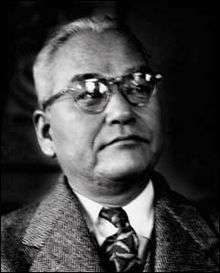Sin Ik-hui
Sin Ik-hui (Chosŏn'gŭl: 신익히, hanja: 申翼熙) (9 June 1892 - 5 May 1956) was a Korean independence activist and politician during the period of Japanese rule.[1] He was Speaker of the National Assembly during President Syngman Rhee's first term (4 August 1948 and 30 May 1950) and second term (19 June 1950 and 30 May 1954). His nickname was Haegong (해공, 海公) or Haehu (해후; 海候); his courtesy name was Yeogu (여구; 如耉).
Sin Ik-hui | |
|---|---|
신익히 | |
 Sin in 1952 | |
| Speaker of the National Assembly | |
| In office 4 August 1948 – 30 May 1954 | |
| Preceded by | Syngman Rhee |
| Succeeded by | Lee Ki-poong |
| Member of the National Assembly | |
| In office 31 May 1948 – 5 May 1956 | |
| Constituency | Gwangju, Gyeonggi |
| Personal details | |
| Born | 9 June 1894 |
| Died | 5 May 1956 (aged 61) |
| Political party | National Association, Democratic Nationalist, Democractic |
| Alma mater | Waseda University |
| Korean name | |
| Hangul | |
| Hanja | |
| Revised Romanization | Sin Ikhi or Sin Ikhui |
| McCune–Reischauer | Sin Ikhi or Sin Ikhŭi |
Life
Sin Ik-hui was a descendant of Sin Rip and Sin Kyung-hee, Sin Saimdang. He was born in Samaru country in Gwangju, Gyeonggi Province. He became an orphan and his second elder half-brother Sin Kyu-hee nurtured him. In his early years, he studied abroad in Japan.
Politician
He was involved in the creation of the Provisional National Assembly of Koreas. He was elected as a Congressman of the Provisional National Assembly of Korea. On April 23, he was appointed to Vice minister of Foreign Affairs of Provisional Government of Korea.
In August 1919, Sin became vice Minister of Justice and in September, he was appointed as Justice Minister and in September 1920, Minister of Foreign Affairs. In 1930s he became an English professor at a Chinese University.
In May 1940 he was appointed to Provisional Government of Korea, and in 1944 he was reappointed to Interior Minister to the Provisional Government.
In May 1948 he was elected Congressman of National Assembly of Korea. On August 4, 1948 he was 2nd term head of First Republic and 19 June 1950, he again was Speaker until 30 May 1954.
In 1955 he was involved with the founding of the Democratic Party and elected as its fourth leader. In 1956 he ran for president, but died of heart failure and overwork at age 64. He had boarded a train to Seoul with John Chang to commence campaigning soon after registration of candidates had closed. Minutes after taking their seats however, Sin became violently ill. He rushed to the toilet, but died. When the November election was held three months later, his name was still on the ballot, and he received close to half of the people's votes.[2]
See also
- National Assembly of Korea
- Provisional National Assembly of Korea
- Provisional Government of Korea
- Syngman Rhee
- Kim Gu
- Kim Kyu-sik
- Chang Myon
References
- Foundation, The Korea (2013-03-30). Korea Focus - August 2012. 한국국제교류재단. p. 28. ISBN 9788986090888.
- Sullivan, Thomas K. (2010-03-17). One Happy Old Priest. Xlibris Corporation. p. 243. ISBN 9781465328823.
External links
| Wikimedia Commons has media related to Shin Ik-hee. |
- Sin Ik-hui (in Korean)
- Haegong Sin Ik-hui memorial museum (in Korean)
- Haegong Sin Ik-hui memorial association (in Korean)
- SamWorld (in Korean)
- Sin Ik-hui:Navercast (in Korean)